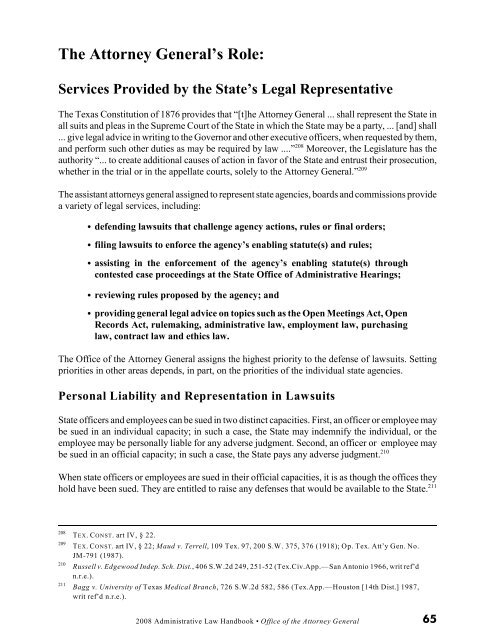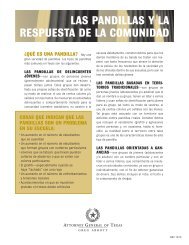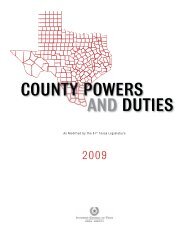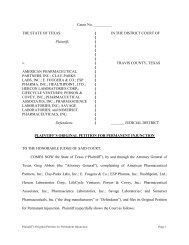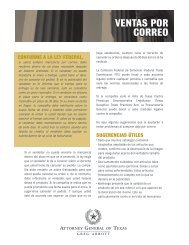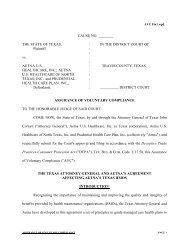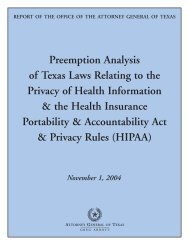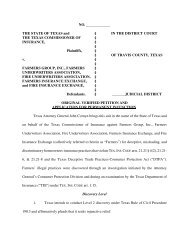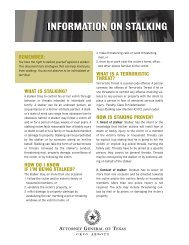Administrative Law Handbook - Texas Attorney General
Administrative Law Handbook - Texas Attorney General
Administrative Law Handbook - Texas Attorney General
Create successful ePaper yourself
Turn your PDF publications into a flip-book with our unique Google optimized e-Paper software.
The <strong>Attorney</strong> <strong>General</strong>’s Role:<br />
Services Provided by the State’s Legal Representative<br />
The <strong>Texas</strong> Constitution of 1876 provides that “[t]he <strong>Attorney</strong> <strong>General</strong> ... shall represent the State in<br />
all suits and pleas in the Supreme Court of the State in which the State may be a party, ... [and] shall<br />
... give legal advice in writing to the Governor and other executive officers, when requested by them,<br />
208<br />
and perform such other duties as may be required by law ....” Moreover, the Legislature has the<br />
authority “... to create additional causes of action in favor of the State and entrust their prosecution,<br />
whether in the trial or in the appellate courts, solely to the <strong>Attorney</strong> <strong>General</strong>.” 209<br />
The assistant attorneys general assigned to represent state agencies, boards and commissions provide<br />
a variety of legal services, including:<br />
defending lawsuits that challenge agency actions, rules or final orders;<br />
filing lawsuits to enforce the agency’s enabling statute(s) and rules;<br />
assisting in the enforcement of the agency’s enabling statute(s) through<br />
contested case proceedings at the State Office of <strong>Administrative</strong> Hearings;<br />
reviewing rules proposed by the agency; and<br />
providing general legal advice on topics such as the Open Meetings Act, Open<br />
Records Act, rulemaking, administrative law, employment law, purchasing<br />
law, contract law and ethics law.<br />
The Office of the <strong>Attorney</strong> <strong>General</strong> assigns the highest priority to the defense of lawsuits. Setting<br />
priorities in other areas depends, in part, on the priorities of the individual state agencies.<br />
Personal Liability and Representation in <strong>Law</strong>suits<br />
State officers and employees can be sued in two distinct capacities. First, an officer or employee may<br />
be sued in an individual capacity; in such a case, the State may indemnify the individual, or the<br />
employee may be personally liable for any adverse judgment. Second, an officer or employee may<br />
be sued in an official capacity; in such a case, the State pays any adverse judgment. 210<br />
When state officers or employees are sued in their official capacities, it is as though the offices they<br />
hold have been sued. They are entitled to raise any defenses that would be available to the State. 211<br />
208<br />
209<br />
210<br />
211<br />
TEX. CONST. art IV, § 22.<br />
TEX. CONST. art IV, § 22; Maud v. Terrell, 109 Tex. 97, 200 S.W. 375, 376 (1918); Op. Tex. Att’y Gen. No.<br />
JM-791 (1987).<br />
Russell v. Edgewood Indep. Sch. Dist., 406 S.W.2d 249, 251-52 (Tex.Civ.App.—San Antonio 1966, writ ref’d<br />
n.r.e.).<br />
Bagg v. University of <strong>Texas</strong> Medical Branch, 726 S.W.2d 582, 586 (Tex.App.—Houston [14th Dist.] 1987,<br />
writ ref’d n.r.e.).<br />
2008 <strong>Administrative</strong> <strong>Law</strong> <strong>Handbook</strong> • Office of the <strong>Attorney</strong> <strong>General</strong> 65


